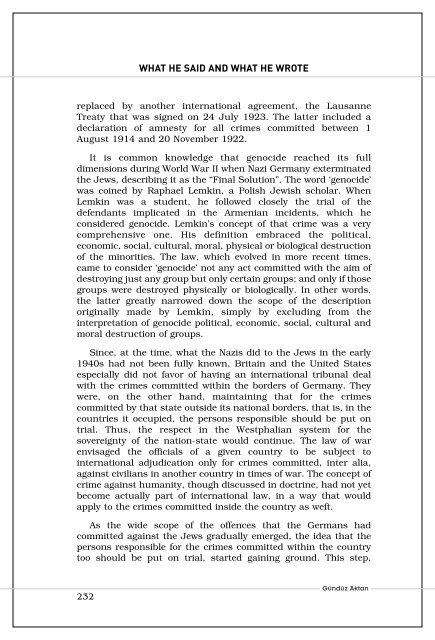gunduz-aktan-kitap-soyledikleri-ve-yazdiklari
gunduz-aktan-kitap-soyledikleri-ve-yazdiklari
gunduz-aktan-kitap-soyledikleri-ve-yazdiklari
Create successful ePaper yourself
Turn your PDF publications into a flip-book with our unique Google optimized e-Paper software.
WHAT HE SAID AND WHAT HE WROTE<br />
replaced by another international agreement, the Lausanne<br />
Treaty that was signed on 24 July 1923. The latter included a<br />
declaration of amnesty for all crimes committed between 1<br />
August 1914 and 20 No<strong>ve</strong>mber 1922.<br />
It is common knowledge that genocide reached its full<br />
dimensions during World War II when Nazi Germany exterminated<br />
the Jews, describing it as the “Final Solution”. The word ‘genocide’<br />
was coined by Raphael Lemkin, a Polish Jewish scholar. When<br />
Lemkin was a student, he followed closely the trial of the<br />
defendants implicated in the Armenian incidents, which he<br />
considered genocide. Lemkin’s concept of that crime was a <strong>ve</strong>ry<br />
comprehensi<strong>ve</strong> one. His definition embraced the political,<br />
economic, social, cultural, moral, physical or biological destruction<br />
of the minorities. The law, which evol<strong>ve</strong>d in more recent times,<br />
came to consider ‘genocide’ not any act committed with the aim of<br />
destroying just any group but only certain groups; and only if those<br />
groups were destroyed physically or biologically. In other words,<br />
the latter greatly narrowed down the scope of the description<br />
originally made by Lemkin, simply by excluding from the<br />
interpretation of genocide political, economic, social, cultural and<br />
moral destruction of groups.<br />
Since, at the time, what the Nazis did to the Jews in the early<br />
1940s had not been fully known, Britain and the United States<br />
especially did not favor of having an international tribunal deal<br />
with the crimes committed within the borders of Germany. They<br />
were, on the other hand, maintaining that for the crimes<br />
committed by that state outside its national borders, that is, in the<br />
countries it occupied, the persons responsible should be put on<br />
trial. Thus, the respect in the Westphalian system for the<br />
so<strong>ve</strong>reignty of the nation-state would continue. The law of war<br />
envisaged the officials of a gi<strong>ve</strong>n country to be subject to<br />
international adjudication only for crimes committed, inter alia,<br />
against civilians in another country in times of war. The concept of<br />
crime against humanity, though discussed in doctrine, had not yet<br />
become actually part of international law, in a way that would<br />
apply to the crimes committed inside the country as weft.<br />
As the wide scope of the offences that the Germans had<br />
committed against the Jews gradually emerged, the idea that the<br />
persons responsible for the crimes committed within the country<br />
too should be put on trial, started gaining ground. This step,<br />
232<br />
Gündüz Aktan



